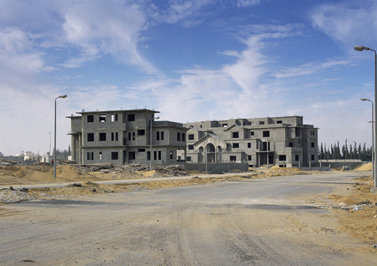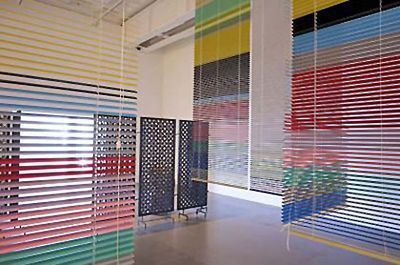No Borders
by Adrian Tahourdin
A thought-provoking exhibition recently opened at the Bristol Museum and
Art Gallery, in partnership with Arnolfini. “No Borders”, featuring a dozen
modern artists from the Middle East, Asia and Africa, “reflects upon the
globalised conditions of the world today and the particular histories and
contexts that inform current art practices”. The show runs until June and is free.
Greeting the viewer in the hall of the gallery are five panoramic
photographs, “Peripheral Stories”, by Hala Elkoussy of the outskirts of Cairo
(all taken before the Arab Spring): waste ground, half-built tower blocks,
electricity pylons, dusty roads - unpeopled. Elkoussy describes her native city
as one that “is changing at a very fast pace” (below).

The Mumbai-born artist Shilpa Gupta’s mesmerizing “In Our Times”
consists of two seesawing old-fashioned-looking microphones mounted on a stand,
one intoning Muhammad Ali Jinnah’s first speech as President of Pakistan in
1947, the other Jawaharlal Nehru’s inaugural address as the first Prime
Minister of newly independent India, all overlaid with plangent vocals. “I
would not like to be called a ‘political’ artist, rather just an ‘everyday’
artist as politics is part of our daily lives . . . “.
Yto Barrada’s photographs show economic migrants asleep in a park in
Tangier as they prepare to undertake the dangerous journey to “fortress”
Europe. Barrada explains that "to cross" is called "to
burn": “you burn your past, your identity, your papers, because if you're
caught on the other side if you're from Algeria you may get permission to stay,
because of the political situation; if you're from Morocco you're sent back
right away. So there's this obsession to get on the other side where the grass
is greener that animates the streets of the city of Tangier, that governs
everything you do from the morning to the night”. Further south we see stark
photographic portraits of sugar-cane cutters by the South African Zwelethu
Mthethwa.
The Lebanese artist Akram Zaatari’s touching and witty film “Tomorrow
Everything Will Be Alright” depicts an epistolary dialogue between two former
lovers: we watch as one types out questions about their relationship on a
manual typewriter and, in a nod to the fact that they haven't communicated for
a decade, the responses instantly arrive on-screen.
The Delhi-born Amar Kanwar’s half-hour film “A Season Outside”, about
the violence and disruption on the Kashmir border between India and Pakistan
(only last week two Indian and two Pakistani soldiers were killed in
skirmishes), opens with the extraordinary flag-lowering ceremony that takes
place at the border gates at sunset - an apparent show of strength on both
sides - and develops into a personal meditation on the intractable
problem.
There are striking works by the Pakistani miniaturists Imran Qureshi and
Shahzia Sikander - “I think that in the West you have a false idea about
Pakistan. It’s believed and wrongly so, that we are gagged and limited in our
artistic production”, writes Imran Qureshi.
Elsewhere we have Ai Weiwei’s compacted, lightly scented and
all-too-tactile (my companion was gently admonished for fingering it) cubic
metre “A Ton of Tea”, apparently made of “Pur Er blend of tea as it is drunk by
ordinary Chinese citizens across the country”.
A centrepiece of the last room is the South Korean artist Haegue Yang's installation, partly made
from Venetian blinds, "Holiday for Tomorrow" (above), which has a curiously labyrinth-like effect.
Peter Stothard's Blog
- Peter Stothard's profile
- 30 followers




